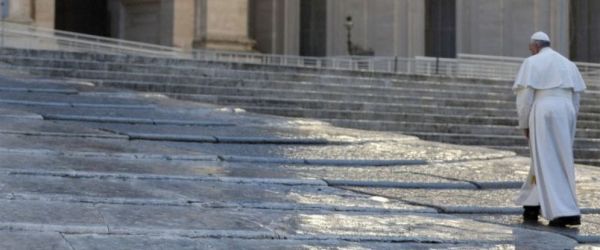Today’s Gospel presents us Saint Luke’s passage on the Beatitudes (cf. 6:17, 20-26). The text is arranged into four beatitudes and four admonitions denoted by the expression, “woe to you”. With these assertive and sharp words, Jesus opens our eyes and lets us look with his gaze, beyond appearances, beyond the surface and teaches us to discern situations with faith.
Jesus proclaims the poor, the hungry, the suffering and the persecuted blessed, and he admonishes those who are rich, satisfied, who laugh and are praised by the people. The reason behind this paradoxical beatitude lies in the fact that God is close to those who suffer, and intercedes to free them from their bondage. Jesus sees this; he already sees the beatitude beyond its negative reality. And likewise, the “woe to you” addressed to those who are doing well today, has the purpose of “waking” them from the dangerous deceit of egotism, and opening them up to the logic of love, while they still have the time to do so.
The page from today’s Gospel thus invites us to reflect on the profound sense of having faith, which consists in our trusting completely in the Lord. It is about demolishing worldly idols in order to open our hearts to the true and living God. He alone can give our life that fullness so deeply desired and yet difficult to attain. Brothers and sisters, indeed there are many in our day too who purport to be dispensers of happiness: they come and promise us swift success, great profits within our reach, magical solutions to every problem and so on. And here it is easy to slip unwittingly into sinning against the first Commandment: namely idolatry, substituting God with an idol. Idolatry and idols seem to be things from another age, but in reality they are of all ages! Even today. They describe certain contemporary attitudes better than many sociological studies do.
This is why Jesus opens our eyes to reality. We are called to happiness, to be blessed, and we become so as of now, to the measure in which we place ourselves on the side of God, of his Kingdom, on the side of what is not ephemeral but rather endures for eternal life. We are happy if we acknowledge we are needy before God — and this is very important: “Lord, I need you” — and if, like him and with him, we are close to the poor, the suffering and the hungry. We too are like this before God: we are poor, suffering, we are hungry before God. Although we possess worldly goods, we experience joy when we do not idolize or sell our souls out to them, but are able to share them with our brothers and sisters. Today the liturgy invites us once again to question ourselves about this and to be truthful in our heart.
Jesus’ Beatitudes are a decisive message which urges us not to place our trust in material and fleeting things, not to seek happiness by following smoke vendors — who are often vendors of death — experts in illusion. We should not follow them because they are unable to give us hope. May the Lord help us open our eyes to acquire a more penetrating view of reality, to heal the chronic shortsightedness with which the worldly spirit infects us. With his paradoxical Word he stirs us and enables us to recognize what truly enriches us, satisfies us, gives us joy and dignity; in other words, what truly gives meaning and fullness to our lives. May the Virgin Mary help us listen to this Gospel passage with open hearts and minds so that it may bear fruit in our life and that we may become witnesses of the happiness that does not disappoint, that of God who never disappoints.
[Pope Francis, Angelus 17 February 2019]












